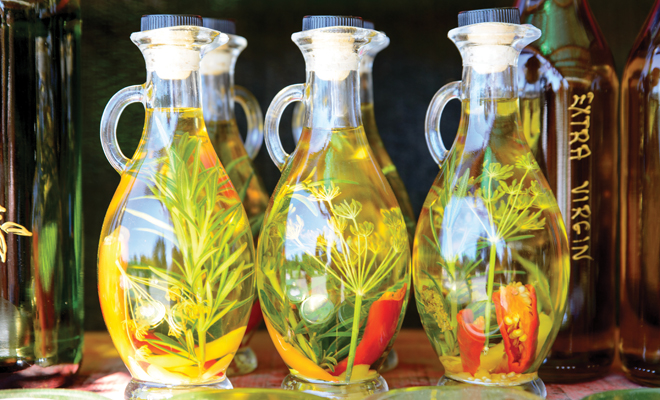
Flavor Fusion: Explore the World of Infused Oils and Vinegars
We were visiting family in a tiny upscale town north of New Orleans when Karen, one of our traveling companions, said, “There’s a little shop here that sells infused olive oils and vinegars.” “I’m game,” I replied, always up for some shopping and to learn something new.
The shop’s walls were lined with copper vats, oils on one side, vinegars on the other, with taps on each and disposable cups for tasting. What a feast for the visual, olfactory and gustatory senses! Karen’s a true foodie; she lives to cook, so her shopping bag was packed with blood orange, dill and garlicky choices. I confess my thoughts were of salad dressing; I could see blackberry-ginger balsamic vinegar combined with lemon fused EVOO working well together. But my interest was piqued.
The variety of flavors at the shop was overwhelming. How can you possibly choose among them? You can only answer that question by tasting different flavors. The specialty stores let you do exactly that, allowing you to sample the product before you buy. The staff are there to help educate customers so you can take your time selecting the flavor profiles that fit your cooking style.
That was a hard start for me. My mom never used olive oil or balsamic vinegar, because none of her recipes called for those ingredients. Mom called her cooking oils by their brand names: Crisco was used for frying and Mazola oil for salad dressing. Vinegar meant one of three flavors: cider vinegar, red wine vinegar and white vinegar, which we called “cleaning vinegar.” If the cooks in our family ever heard the words balsamic or EVOO, they would have thought it had nothing to do with cooking.
My mom and dad both would have frowned at the thought of buying expensive flavored products that you only use in salad dressing. If you’re not an experienced foodie as Karen is, you may need ideas for different ways of using these ingredients. I’m happy that shopping with my friend made me more receptive to using this whole new world of flavors.
Specialty olive oils are definitely not just for salad dressings. They can be used for nearly every course, from appetizers to dessert:
Appetizers
Choose a flavored oil and flavored vinegar that combine well, adding any other fresh or dried herbs, for a bread dipping sauce; try garlic infused olive oil with balsamic vinegar infused with Italian herbs. Use flavored balsamic vinegar, add honey to it, and simmer until it is reduced by half to make a reduction sauce to use for garnish on a cheese tray.
Eggs
Scrambled eggs or omelets can be made with oils flavored with your favorite herbs, garlic or spices. Don’t forget to drizzle a few drops on top after you plate the eggs.
Fruit
Add lemon or blood orange-flavored oil or vinegar to jazz up a fruit salad. Top grilled fruit, such as peaches and pineapple or fruit kebabs with the same honey balsamic reduction sauce used for appetizers. Experiment with vinegars flavored with fruit or fiery spices.
Soup
Liven up a creamy vegetable soup with a few drops of flavored olive oil, the spicier the better, such as chipotle, jalapeño, habanero or harissa oils.
Pizza, Pasta, Rice
Small amounts of intensely flavored oil can add a wow factor to your favorite dishes. Try black or white truffle oil on pizza or risotto, gremolata oil on pasta (gremolata is an infusion of garlic, lemon zest and parsley).
Roasted Vegetables
Substitute half of the regular oil you use with a flavored oil that complements the vegetable, such as basil, dill, garlic, rosemary or sage.
Baking and Dessert
Baked goods such as cakes, sugar cookies and scones may benefit from a judicious amount of lemon or orange oil. Don’t use too much as it may affect the texture during baking. Serve cake on plates garnished with swirls of balsamic vinegar flavored with cherry, chocolate, espresso or raspberry. Grilled fruit can be served over ice cream and topped with honey-balsamic vinegar reduction sauce.
Perhaps the best part of using a variety of olive oils is enjoying the health benefits that they bring. Olive oil is a fat that is high in calories, but it provides monounsaturated fat, which is considered heart-healthy. Substituting other fats in your diet with olive oil can help reduce your LDL cholesterol. Research also shows that olive oil might be helpful if you have Type 2 diabetes, as it can help maintain insulin and blood-sugar levels.
More good news: balsamic vinegar also packs a healthy punch. It has antiglycemic properties, which means your blood sugar will spike less when you use balsamic vinegar. And the acetic acid in balsamic vinegar helps aid digestion and lower cholesterol. ■
Sources: cheaprecipeblog.com.








